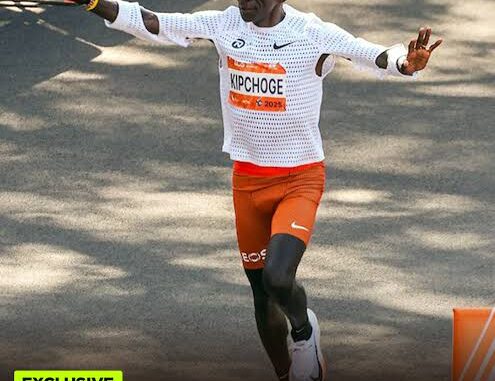
At 40 years old, the Kenyan marathon legend stood once again on the starting line of the 2025 New York City Marathon, ready to test himself against the world. The morning was crisp, the crowds electric, and anticipation filled the air. For a man who has broken barriers, shattered world records, and twice claimed Olympic gold, every race carries the weight of history. Yet, when the dust settled, Kipchoge crossed the line in 2:14:36, finishing 17th — far from the podium, far from his best, and certainly far from the fairy-tale many had hoped for.
And yet, that’s exactly what makes this story so deeply inspiring.
Because even the greatest of all time has days when things don’t go to plan. Days when the rhythm disappears, when the legs refuse to respond, and when the body simply says “not today.” For most runners, such moments lead to frustration or excuses. But Kipchoge? He chose grace. He crossed the finish line with a smile, congratulated those who had beaten him, and reminded the world — in that quiet, humble way he’s known for — that failure is not the opposite of greatness; it’s part of it.
Kipchoge’s career has always been about more than times and medals. It has been about discipline, character, and philosophy. He famously says, “No human is limited.” But perhaps what he showed in New York is that no champion is immune — immune to pain, disappointment, or decline. And that’s what keeps his story human and relatable, even as his achievements seem superhuman.
For perspective, let’s not forget what that “bad day” really means. A marathon in 2:14:36 is a pace of just over five minutes per mile — a speed most elite runners would consider extraordinary. For 99.9% of marathoners, it’s a time they could never dream of touching. Yet for Kipchoge, it’s his worst result. That contrast alone is a testament to the impossibly high standards he’s set over the past two decades.
Still, true greatness isn’t about perfection. It’s about consistency, humility, and resilience. Kipchoge has always embodied those values, whether breaking the two-hour barrier in Vienna or finishing 17th in New York. Each race, win or lose, becomes part of a greater legacy — one that celebrates effort, not just outcome.
So, the next time your run doesn’t go as planned — when you struggle to hit your pace or finish feeling drained — remember Kipchoge’s New York story. Remember that even the best stumble, even the strongest falter, and even the fastest slow down. What matters most isn’t the time on the clock, but the spirit in your stride.
Eliud Kipchoge’s 2:14:36 marathon wasn’t a failure. It was a message — that endurance is not only physical, but deeply human. And in that humanity lies the true heart of a champion.
Be the first to comment